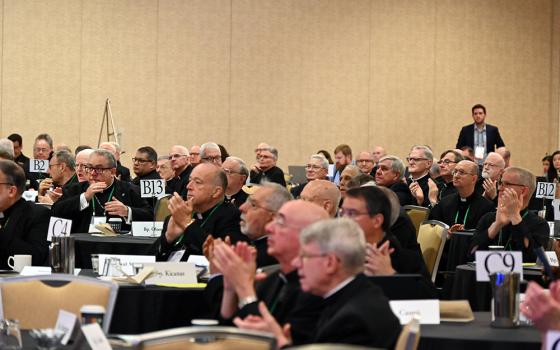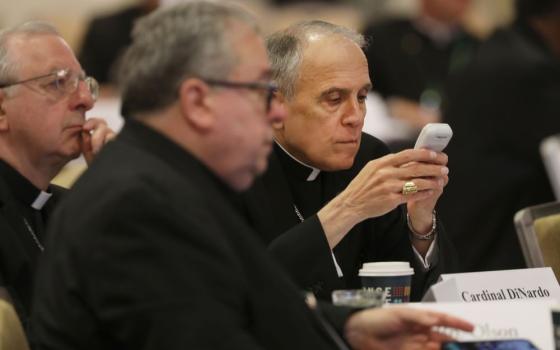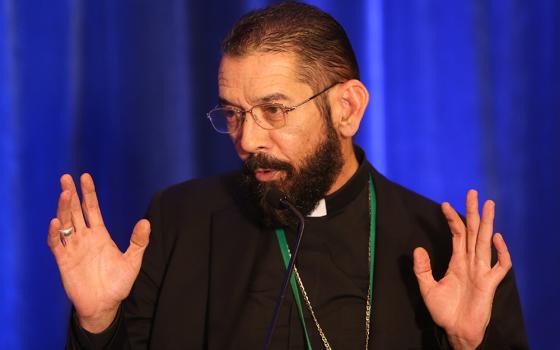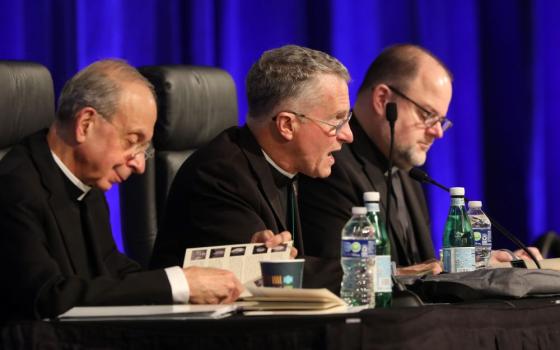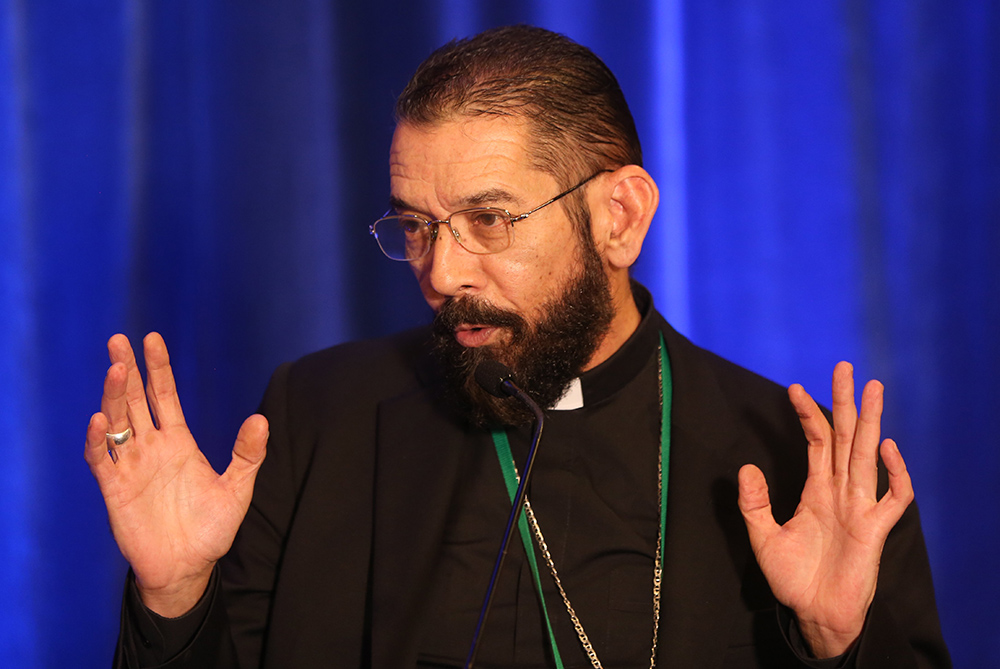
Bishop Daniel Flores of Brownsville, Texas, speaks June 15, 2023, during a news conference at the U.S. Conference of Catholic Bishops' spring plenary assembly in Orlando, Florida. Flores chairs the conference's Committee on Doctrine. (OSV News/Bob Roller)
The United States Catholic bishops voted June 16 to begin the process of revising their official directives for American Catholic health care institutions to mandate that Catholic facilities not provide gender-affirming medical treatment to transgender patients.
The bishops made that decision in a unanimous voice vote during their spring 2023 plenary assembly in Orlando, Florida. Bishop Daniel Flores of Brownsville, Texas, who chairs the U.S. Conference of Catholic Bishops' Committee on Doctrine, presented the agenda item before the vote.
Originally scheduled for June 15 but postponed because of time constraints, the bishops' vote is expected to align the directives with a doctrinal note the bishops released in March that focused on what the prelates called the "moral limits to technological manipulation of the human body."
The doctrine committee published that document, signaling the beginning of what could be a substantial change in how Catholic hospitals, clinics and facilities across the U.S. care for patients who are transgender and those diagnosed with gender dysphoria.
Before the vote, several bishops expressed their hopes that the doctrine committee will consult widely with Catholic health care providers and others as it goes about revising the ethical and religious directives, or ERDs, which also include the bishops' mandates on issues that include end-of-life care and abortion.
Cardinal Joseph Tobin of Newark, New Jersey, also called for consultation with people from the transgender community, noting the importance of listening to people.
San Diego Cardinal Robert McElroy said that the bishops' health care directives are "meant to be a pastoral medical document to inform and guide" the nation's Catholic health care ministries.
Meanwhile, Bishop Michael Olson of Fort Worth, Texas, said the doctrine committee listened to transgender people but added that there remains "a lack of clarity between what is authentic gender dysphoria and the gender ideology that in part is preying upon these people and increasing their suffering."
Flores said revising the directives on transgender care "is a sensitive matter and will require a wide consultation."
Following the vote to begin revising the health care directives, Archbishop Timothy Broglio of the Military Services, the bishops' conference president, told Flores, "You have your work cut out for you."
Advertisement
Opinions among Catholic theologians, bioethicists and LGBTQ advocates have been split about the bishops' controversial doctrinal note on gender-affirming care for transgender patients and those diagnosed with gender dysphoria. Some observers said the document's language reflected a cautious approach in an area of moral theology and doctrine that is not yet fully developed. Others said the note demonstrated a lack of understanding and engagement with transgender people.
Tobin told NCR that the March 20 doctrinal note reflected "limited consultation" with the transgender community. "You need to broaden that," he said, adding that he hopes the doctrine committee heard that message.
Olson, a member of the bishops' doctrine committee, told NCR that the committee consulted extensively with members of the transgender community. Olson said he also met with Dominican Sister of Peace Luisa Derouen, who has ministered among the transgender community since the 1990s.
"It involved a great deal of listening," said Olson, who declined to give a timeline as to when the doctrine committee might finish the revisions. He said the committee will proceed carefully. He described revising the directives as a "synodal" process that will require significant listening to show pastoral sensitivity and compassion to people while staying true to Catholic moral doctrine.
The bishops' June 16 public session also included several votes on other agenda items. The bishops approved the National Pastoral Plan for Hispanic/Latino Ministry, which grew out of the September 2018 Fifth National Encuentro of Hispanic Ministry.
A majority of the 171 voting bishops — significantly smaller than the 237 who voted at the conference's plenary assembly last November — also voted to approve the drafting of a new pastoral statement to address persons with disabilities in the life of the church as well as new English translations of several liturgical texts, including the Liturgy of the Hours.
The bishops also voted to approve revised statutes of the International Commission on English in the Liturgy, which prepares English translations of liturgical texts. In 2021, the priest who heads the commission used his public social media page to criticize Pope Francis' restrictions on the pre-Vatican II Latin liturgy.
Whereas the bishops approved most measures without debate, one agenda item that prompted discussion before ultimately passing was the second edition of the conference's Basic Plan for the Ongoing Formation of Priests.
Some bishops criticized the priestly formation document for being too long and said they had not had sufficient time to read it. A few bishops expressed concern for language in the document that expounded on "spiritual fatherhood," suggesting that that imagery could appeal to young priests with "narcissistic" attitudes or the kind of hubris that one bishop said had led one priest in his diocese to have "seven spiritual daughters."
Other bishops defended the document as a helpful guide that had been crafted after years of careful work.
The priestly formation document passed with 144 bishops voting in favor of it, 24 against, and three abstaining.




